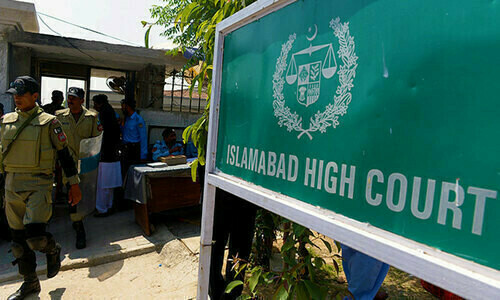BAGHDAD, Feb 24: Iraq’s most influential Shia political leader called on Friday for Sunni-Shia unity as religious figures sought to calm passions and pull the nation from the brink of civil war after the bombing of a Shia shrine two days ago and a wave of deadly reprisal attacks.
The government, meanwhile, announced stepped-up security measures, including a ban on entering or leaving Baghdad and deployment of armed forces in tense areas.
An extraordinary daytime curfew in Baghdad and three nearby provinces appeared to have blunted the wave of attacks on Sunni mosques that followed Wednesday’s bombing, which destroyed the golden dome of the Shia Askariya shrine in Samarra.
Still, Iraqis feared the violence that killed about 130 people after the Samarra attack had pushed the country closer to sectarian civil war than at any time since the US-led invasion nearly three years ago.
Several joint Sunni-Shia prayer services were announced for Friday, including one at the Askariya shrine. But security forces turned away about 700 people, virtually all of them Sunnis, who showed up for the prayers.
In a statement read over national television, top Shia leader Abdul-Aziz al-Hakim, head of the Supreme Council for the Islamic Revolution in Iraq, said those who carried out the bombing in Samarra “do not represent the Sunnis in Iraq.”
Al-Hakim instead blamed Saddam Hussein loyalists and followers of Al Qaeda in Iraq boss Abu Musab al-Zarqawi.
“We all have to unite in order to eliminate them,” al-Hakim said in a statement. “This is what al-Zarqawi is working for, that is, to ignite sectarian strife in the country,” he added. “We call for self-restraint and not to be dragged down by the plots of the enemy of Iraq.”
Dhafer al-Ani, spokesman for the biggest Sunni Arab bloc in parliament, praised al-Hakim’s statement, calling it “a step on the road of healing the wounds.” But he said his Iraqi Accordance Front was still waiting for an apology from the government for failing to protect Sunni mosques from reprisal attacks, as well as a commitment to repair the damage and bring those responsible to justice.
The Sunni bloc on Thursday suspended talks with the main Shia alliance about forming a new government until its demands are met.
US ambassador Zalmay Khalilzad acknowledged the danger facing Iraq _ and the US strategy for disengaging from this country. But he also said this was a “moment of opportunity” for Iraq.
“This tragedy can be used to bring people together,” Khalilzad told reporters.
He was confident that Sunni politicians would return to the negotiating table, saying: “Iraqis do not have a better alternative than to form a government of national unity.”
Prime Minister Ibrahim al-Jaafari, a Shia, said he had deployed Iraqi armed forces in areas of friction and banned all vehicles from entering or leaving the capital other than police cars, ambulances and government trucks.
He also said measures had been taken to protect holy sites, ban the carrying of unauthorised weapons in the streets, and to rebuild the Shia shrine in Samarra. A committee was appointed to establish responsibility for the “Samarra catastrophe,” he said. But he did not mention Sunni mosques damaged in reprisal attacks.
Late Thursday, Iraqi state television announced an extension of the nighttime curfew until 4pm Friday in Baghdad and the nearby provinces of Diyala, Babil and Salaheddin, where the shrine bombing took place. But security forces permitted worshippers to walk to mosque for midday prayers, which were followed by demonstrations in a number of cities.
A large crowd attended the service at Abu Hanifa mosque, Baghdad’s most important Sunni site, where Imam Ahmed Hasan al-Taha denounced the attack on the Shia shrine as a conspiracy intended to draw Iraqis into sectarian strife.—AP











































Dear visitor, the comments section is undergoing an overhaul and will return soon.